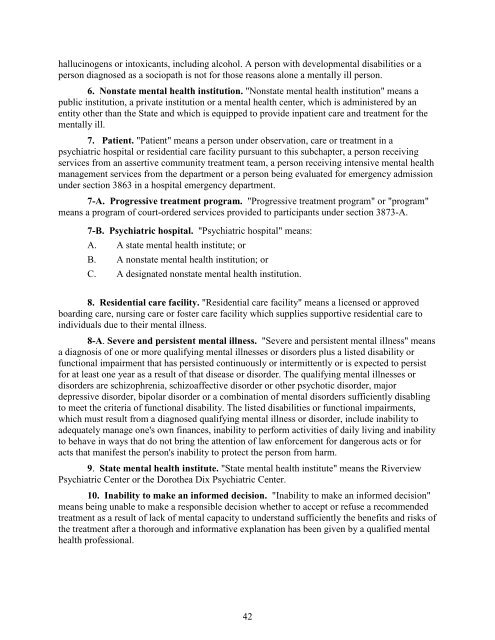involuntary hospitalization and outpatient services laws - Disability ...
involuntary hospitalization and outpatient services laws - Disability ...
involuntary hospitalization and outpatient services laws - Disability ...
Create successful ePaper yourself
Turn your PDF publications into a flip-book with our unique Google optimized e-Paper software.
hallucinogens or intoxicants, including alcohol. A person with developmental disabilities or a<br />
person diagnosed as a sociopath is not for those reasons alone a mentally ill person.<br />
6. Nonstate mental health institution. "Nonstate mental health institution" means a<br />
public institution, a private institution or a mental health center, which is administered by an<br />
entity other than the State <strong>and</strong> which is equipped to provide inpatient care <strong>and</strong> treatment for the<br />
mentally ill.<br />
7. Patient. "Patient" means a person under observation, care or treatment in a<br />
psychiatric hospital or residential care facility pursuant to this subchapter, a person receiving<br />
<strong>services</strong> from an assertive community treatment team, a person receiving intensive mental health<br />
management <strong>services</strong> from the department or a person being evaluated for emergency admission<br />
under section 3863 in a hospital emergency department.<br />
7-A. Progressive treatment program. "Progressive treatment program" or "program"<br />
means a program of court-ordered <strong>services</strong> provided to participants under section 3873-A.<br />
7-B. Psychiatric hospital. "Psychiatric hospital" means:<br />
A. A state mental health institute; or<br />
B. A nonstate mental health institution; or<br />
C. A designated nonstate mental health institution.<br />
8. Residential care facility. "Residential care facility" means a licensed or approved<br />
boarding care, nursing care or foster care facility which supplies supportive residential care to<br />
individuals due to their mental illness.<br />
8-A. Severe <strong>and</strong> persistent mental illness. "Severe <strong>and</strong> persistent mental illness" means<br />
a diagnosis of one or more qualifying mental illnesses or disorders plus a listed disability or<br />
functional impairment that has persisted continuously or intermittently or is expected to persist<br />
for at least one year as a result of that disease or disorder. The qualifying mental illnesses or<br />
disorders are schizophrenia, schizoaffective disorder or other psychotic disorder, major<br />
depressive disorder, bipolar disorder or a combination of mental disorders sufficiently disabling<br />
to meet the criteria of functional disability. The listed disabilities or functional impairments,<br />
which must result from a diagnosed qualifying mental illness or disorder, include inability to<br />
adequately manage one's own finances, inability to perform activities of daily living <strong>and</strong> inability<br />
to behave in ways that do not bring the attention of law enforcement for dangerous acts or for<br />
acts that manifest the person's inability to protect the person from harm.<br />
9. State mental health institute. "State mental health institute" means the Riverview<br />
Psychiatric Center or the Dorothea Dix Psychiatric Center.<br />
10. Inability to make an informed decision. "Inability to make an informed decision"<br />
means being unable to make a responsible decision whether to accept or refuse a recommended<br />
treatment as a result of lack of mental capacity to underst<strong>and</strong> sufficiently the benefits <strong>and</strong> risks of<br />
the treatment after a thorough <strong>and</strong> informative explanation has been given by a qualified mental<br />
health professional.<br />
42


